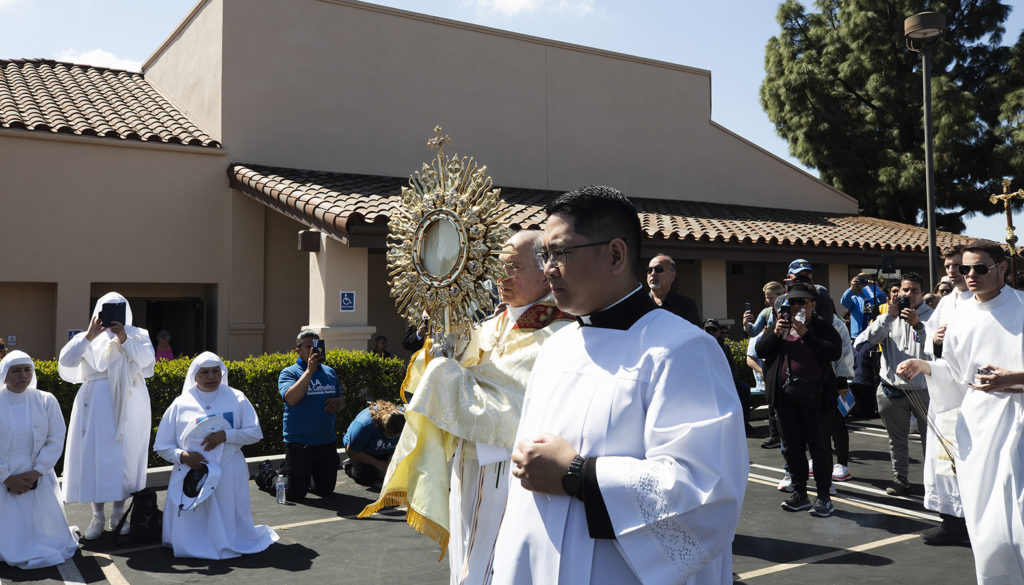On the solemnity of the Annunciation, more than 1,000 of the faithful joined me in a 6-mile eucharistic procession.
We began with Mass at Mission San Gabriel Arcángel and then made a prayerful pilgrimage to St. Luke the Evangelist Church in Temple City, where we prayed some more before returning to the mission.
The procession was another part of our local observance of the three-year-long national “Eucharistic Revival” launched by the U.S. Catholic bishops.
Excitement is building around this revival. Thousands from across the country and different parts of the world “took part” in our procession through our social media platforms. I was touched by their comments and prayers.
A Facebook user from Kenya declared, “I AM not ashamed to proclaim that Jesus is the way.”
On Instagram, a woman described how she cried with joy while watching our video of the procession. Another posted, “Beautiful day with our Lord and Church family. I saw a woman drop to her knees on the sidewalk when she saw the Eucharist.”
Eucharistic devotion is devotion to Jesus Christ. The oldest of these devotions — the eucharistic procession and eucharistic adoration — are rooted in the experience of those who first knew Jesus.
In the joyful mystery of the rosary called the Visitation, we recall how immediately after the angel’s annunciation, Blessed Mary went in haste to visit her cousin, Elizabeth.
Our Blessed Mother carried Jesus in her womb through the hill country of Judea. We are doing something similar when we carry the Eucharist in the monstrance in procession through our streets and neighborhoods.
In eucharistic adoration, we are following the example of the Magi who came from the East following the Christmas star.
When they entered the house and saw the baby Jesus with his mother, they fell down on their knees and worshipped him. We do the same thing when we adore him on our knees at our tabernacles and altars.
Through our eucharistic devotion, we acknowledge the amazing reality that Jesus Christ, the Word of God, out of love for us has become flesh to dwell among us.
The summit of our devotion is the holy Mass, which Jesus left us as a parting gift on his last night on earth, the night we remember as Holy Thursday.
The Gospel accounts of his Last Supper on Holy Thursday are filled with tender sadness. Jesus is saying goodbye to his loved ones. We recall the apostle John resting his head on Jesus’ chest as they sat at table, a gesture of profound sorrow.
He had come down from heaven out of love, emptying himself in humility to share in our humanity. He had not come as a king or a master. He came as a servant.
On Holy Thursday, he knelt before his apostles and washed their feet, in a final, unforgettable image of humility and service.
He was washing them, purifying them, making them worthy to sit at his table and receive the gift of himself.
Jesus had made his whole life a gift that he offered to God out of love for us and for the life of the world. He became flesh in the womb of the Virgin Mary in order to offer his flesh on the cross.
And in this final gift, he gave his body and blood, his soul and divinity, present under the appearances of bread and wine, to be our food, to nourish and strengthen us as we make our journey through life.
On Holy Thursday and again on Good Friday, Jesus shows us what true love looks like. And he shows us how we are to worship God in spirit and truth.
Almighty God does not want “something” from us, because there is nothing we could give him that he needs. That’s why Jesus did away with the burnt offerings and animal sacrifices of old.
The worship that God desires is nothing less than the gift of ourselves — our whole lives offered completely to God in thanksgiving for the new life that he gives us in Jesus Christ.
In washing his disciples’ feet, Jesus said he was giving them “a model to follow.” The Eucharist is the path that he calls us to follow.
The Eucharist is how we worship, and the Eucharist is how we are called to live.
As he gave his life for us on the cross, and as he continues to make himself a gift to us in the bread and wine, he calls us now to make our own lives “a Eucharist,” a perfect offering to him.
Pray for me and I will pray for you.
And as we enter into Holy Week, let us ask holy Mary to help us to enter more deeply into the amazing mystery of her Son’s love, and his gift of himself in the Eucharist.

